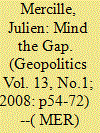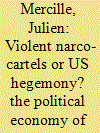|
|
|
Sort Order |
|
|
|
Items / Page
|
|
|
|
|
|
|
| Srl | Item |
| 1 |
ID:
084640


|
|
|
|
|
| Publication |
2008.
|
| Summary/Abstract |
In this paper, I outline three main issues that divide classical and critical geopolitics and offer a critique of the latter. The three issues are (1) criticism, (2) the relative importance of discourses vs. materiality/political economy, and (3) the status of knowledge claims (universal or partial). Through this discussion I present my own view, whose central claim is that versions of critical geopolitics relying to a great extent on discursive analysis should pay more attention to political economic factors. True, most studies in critical geopolitics pay attention to the institutional affiliation of political elites, but very few discuss the workings of the political economic system within which policy is formulated. To illustrate my points empirically, I discuss the bomber gap of the 1950s; the gap refers to the alleged fall of the United States behind the Soviet Union in strategic bombers under Eisenhower, a scare that gave rise to influential discourses describing American military inferiority.
|
|
|
|
|
|
|
|
|
|
|
|
|
|
|
|
| 2 |
ID:
081555


|
|
|
|
|
| Publication |
2008.
|
| Summary/Abstract |
US politics seems to be chronically afflicted with high levels of military spending justified by security "crises", the current upsurge under the Bush administration being only the latest episode in a long series. This paper addresses the question, "Why are the levels of US military spending so high?" to which it provides a "radical" geographical answer. Although in the conclusion I offer thoughts on how my points apply to the current situation, I do not claim that the analysis applies directly to the post-war period as a whole, but only to that of the case study, the bomber and missile gaps of 1955-1961, two successive "crises" that led to increases in defence expenditures. I argue that although the "immediate" causes of the "gaps" and ensuing military spending may be found at the national and local scales, some of their fundamental roots are to be located in US post-war plans to organise the global space of the capitalist world economy. I will show how such plans?-?as found in important declassified documents like NSC-68 and the Gaither Report as well as those related to the Vietnam War and counterinsurgency policies?-?explicitly called for military spending to maintain American hegemony. Moreover, those documents reveal geographical assumptions reminiscent of Mackinder's geopolitics, hegemony and world-systems theories. Finally, examining the geopolitics and geoeconomics of US military spending makes a contribution to a subject to which geographers have paid only limited attention
|
|
|
|
|
|
|
|
|
|
|
|
|
|
|
|
| 3 |
ID:
105064


|
|
|
|
|
| Publication |
2011.
|
| Summary/Abstract |
Mainstream commentary suggests that the United States and NATO are conducting a war on drugs in Afghanistan in order to reduce drug consumption in the West and Afghanistan and weaken the Taliban. Interpreting U.S. foreign policy from a critical political economic perspective, this article presents an alternative analysis, arguing thatWashington and NATO are not pursuing a real war on drugs in Afghanistan. This point is demonstrated by examining a number of aspects of the so-called war on drugs: the Taliban's relatively small role in drug trafficking; U.S./NATO support for proxy forces involved in the drug trade; the focus on poppy cultivation over drug money; the chemical precursor trade; money laundering; Western support for tobacco and alcohol industries; and the emphasis on overseas operations and enforcement and neglect of drug treatment and prevention. In each case, U.S./NATO policies directly support or tolerate the drug trade-the opposite of what a real war on drugs would entail. It is therefore suggested that the so-called war on drugs is better seen as a rhetorical device used by the U.S. to facilitate overseas military intervention and the fight against insurgents opposed to U.S. policies in Afghanistan.
|
|
|
|
|
|
|
|
|
|
|
|
|
|
|
|
| 4 |
ID:
108103


|
|
|
|
|
| Publication |
2011.
|
| Summary/Abstract |
Mainstream analysis and commentary on drug trafficking and related violence in Mexico focuses overwhelmingly on the narco-cartels as sources of the problem and presents the US as a well intentioned player helping to conduct a 'war on drugs' out of concern for addiction, crime and violence. This article offers an alternative interpretation, grounded in critical political economy, showing that in addition to fuelling the narcotics industry in Mexico thanks to its large drug consumption and loose firearms regulations, the US shares much responsibility for its expansion thanks to its record of support for some of the main players in the drugs trade, such as the Mexican government and military, and by implementing neoliberal reforms that have increased the size of the narcotics industry. The war on drugs has served as a pretext to intervene in Mexican affairs and to protect US hegemonic projects such as nafta, rather than as a genuine attack on drug problems. In particular, the drugs war has been used repeatedly to repress dissent and popular opposition to neoliberal policies in Mexico. Finally, US banks have increased their profits by laundering drug money from Mexico and elsewhere; the failure to implement tighter regulations testifies to the power of the financial community in the US.
|
|
|
|
|
|
|
|
|
|
|
|
|
|
|
|
|
|
|
|
|